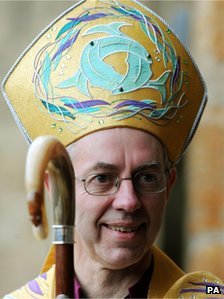Justin Welby 'to be named as new Archbishop of Canterbury'
 Bishop of Durham Justin Welby is due to be named as the next Archbishop of Canterbury, press reports claim. It follows increasing speculation that the 56-year-old will replace Rowan Williams, who steps down in December after 10 years in the post.
Bishop of Durham Justin Welby is due to be named as the next Archbishop of Canterbury, press reports claim. It follows increasing speculation that the 56-year-old will replace Rowan Williams, who steps down in December after 10 years in the post.
He only became a bishop a year ago when he took up the fourth most senior post in the Church of England.
On Tuesday, leading bookmakers stopped taking bets on the succession after a run of bets on Bishop Welby.
The Daily Telegraph reports that Bishop Welby has agreed to accept the post. The Times newspaper says he will be named as the new Primate this week.
Bishop Welby was educated at Eton and Cambridge University, and then spent 11 years in the oil industry before studying theology at Durham. He was ordained in 1992.
He became Bishop of Durham in November 2011, after serving as Dean of Liverpool since 2007.
'Build unity'
Ruth Gledhill, religious affairs correspondent at the Times, told BBC Radio 4's Today programme that Bishop Welby's strong financial background and business sense, as a result of his time working in the oil industry, was likely to have been viewed as valuable experience.
She said he had worked as the Archbishop of Canterbury's special envoy to Africa, attempting to build unity between Christian and Muslim communities in Nigeria.
The journalist said the bishop was thought to be "conservative on the issue of gay marriage" and was "absolutely in favour of women bishops, but strong on protecting the position of traditionalists in the Church".
The Crown Nominations Commission - which nominates two candidates to the prime minister, who advises the Queen on the appointment - held a three-day meeting in September to consider the contenders for the post, but no announcement followed.
Dr Williams's successor will become the 105th Archbishop of Canterbury, and the nominal leader of 77 million Anglicans worldwide - though conservative Anglican provinces, especially in Africa, have been setting up alternative organisational structures of their own.


 Votes : 0
Votes : 0









